How to Access Spotify for Artists Using DistroKid

DistroKid is a digital music distribution service that enables musicians and artists to release their music on multiple streaming platforms. It’s particularly beneficial for accessing Spotify for Artists, providing a streamlined pathway for artist verification and music management.
DistroKid boasts a diverse user base, including independent musicians, DIY musicians, emerging artists, and others. It has been instrumental in the success of several artists, such as Steve Lacy, Jacob Collier, and Gus Dapperton.
DistroKid’s pricing plans are affordable, with the Musician Plan starting at approximately $22.99 per year, allowing unlimited singles and albums for distribution.
Accessing Spotify for Artists app using DistroKid is a straightforward process; the exact steps are outlined in this article.
One of the standout features of DistroKid is that artists retain 100% of their earnings from music sales and streams. However, DistroKid has limitations, including a lack of personalized support and physical distribution. Despite these, it remains a popular choice for independent musicians due to its user-friendly interface, fast distribution times, and comprehensive analytics.
Although there are alternative digital music distributors like TuneCore, CD Baby, Reverbnation, and others that offer services like music publishing, sync licensing, and analytics, DistroKid stands out with its emphasis on empowering artists to retain control over their earnings and its seamless integration with Spotify for Artists.
- What is DistroKid?
- How to Access Spotify for Artists Using DistroKid Account?
- What Are the Advantages and Disadvantages of Using DistroKid?
- What Are Other Digital Music Distributors and Aggregators?
What is DistroKid?
DistroKid is a leading digital music distribution service that empowers independent artists and musicians to quickly and efficiently release their music across multiple streaming platforms.
By acting as a bridge between artists and streaming services like Spotify, Apple Music, Amazon Music, and more, DistroKid simplifies the music distribution process, making it accessible to musicians of all levels. With its user-friendly interface and comprehensive features, DistroKid enables artists to upload their tracks, albums, and singles and distribute them worldwide to a vast audience, allowing artists to focus on their creativity and connecting with fans.
At the same time, DistroKid handles the technical aspects of distribution.
Why Should You Use DistroKid for Spotify for Artists?
You should use DistroKid for Spotify for Artists because it offers seamless integration between music distribution and artist verification, serving as a verified partner of Spotify. This ensures that once you distribute your music through DistroKid, you gain instant access to the Spotify for Artists platform.
DistroKid for Spotify for Artists provides quick artist verification, centralized music management, enhanced analytics, convenient communication, and budget-friendly options. This makes DistroKid’s preferred choice for accessing and managing an artist profile on Spotify for those who use it.
Who Uses DistroKid?
DistroKid caters to a diverse community of artists and musicians, offering a convenient and efficient solution for their music distribution needs.
The platform has been used by a wide range of music creators, including:
- Independent Musicians
- DIY Musicians
- Emerging Artists
- Niche Genres
- Collaborative Projects
As an independent artist, a service provider like Distrokid is the best choice to start your music career. Many successful artists released their first projects and kept firing them using Distrokid.
Examples of successful artists using DistroKid are listed below.
- Steve Lacy: An accomplished musician and producer associated with the Grammy-nominated band “The Internet.” Steve Lacy utilized DistroKid to release his solo project “Steve Lacy’s Demo” and reach a wider audience with his soulful R&B sound.
- Jacob Collier: A multi-instrumentalist and Grammy-winning artist known for his intricate arrangements and musical prowess. Jacob Collier has used DistroKid to release his innovative and genre-blending albums.
- Gus Dapperton: Gus Dapperton is an indie-pop artist and rising star in the music scene. Gus used DistroKid to release his early singles and EPs, attracting a dedicated following and leading to record label deals.
- Dodie: Singer-songwriter and YouTuber Dodie turned to DistroKid to release her music independently. This contributed to her popularity on streaming platforms, garnering her a devoted fanbase.
- Daniel Caesar: Grammy-nominated R&B artist Daniel Caesar, known for his soulful and dynamic music, has used DistroKid to release some of his earlier works.
And I cannot forget my man Luda, who released his single “Vitamin D (feat. Ty Dolla $ign)” using Distrokid.
“DistroKid is the future.” – Ludacris.
How Much Does DistroKid Account Cost?
Distrokid is a budget-friendly way to put your music out there. Below is a breakdown of the offered plans and the pricing.
- Musician Plan: Yearly fee, allows unlimited singles and albums for distribution – approximately $22.99 per year. (You can upload music for one artist’s profile.)
- Musician Plus Plan: Additional yearly fee for faster delivery and customizable release dates – approximately $39.99 annually. (You can upload music for two artist profiles.)
- Label Plan: For multiple artists, unlimited releases, and advanced customization options – approximately $89.99 – $1,349.99 annually. (You can upload music for 5 – 100 artist profiles)
Feel free to check out my dedicated article on how much it costs to upload music on Spotify.
What Percentage of Royalties Does DistroKid Keep?
With DistroKid, artists keep 100% of their earnings from music sales and streams. This means that DistroKid does not take any percentage or cut of the royalties generated from the music distributed through their platform.
When your music is streamed or downloaded on platforms like Spotify, Apple Music, Amazon Music, and others, DistroKid ensures that all the royalties earned from these streams and sales go directly to the artist. This is one of the main reasons DistroKid has been a popular choice for independent musicians. It allows them to retain complete control over their earnings and keep all the revenue generated from their music.
However, other platforms and services related to music distribution, such as streaming media or performance rights organizations (PROs), may have their royalty structures and retain a portion of the revenue for their services. But when it comes to DistroKid’s role in the process, they do not take any percentage of the artist’s royalties.
How to Access Spotify for Artists Using DistroKid Account?
Accessing a verified Spotify artist profile through Distrokid is a very straightforward process – the steps are described below.
1. Sign in to your DistroKid Account
If you still need a DistroKid account, visit the DistroKid website at distrokid.com and sign up for an account.
Choose the DistroKid plan that aligns with your needs and complete the registration process.
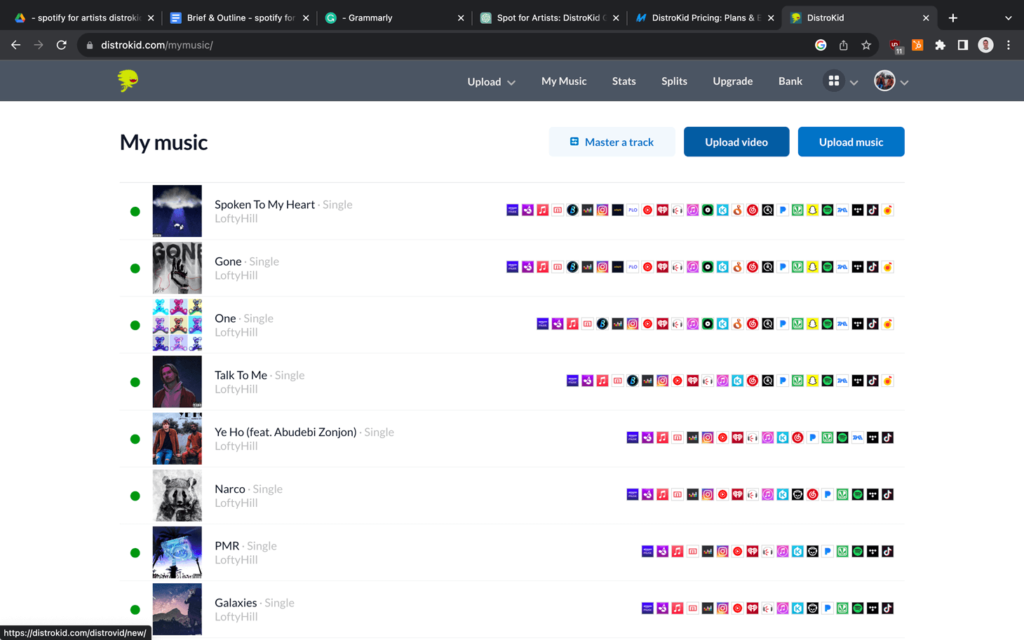
2. Access the DistroKid Feature Menu
Once you’re logged into your DistroKid account, locate the feature menu.
It’s usually in the upper right corner of the dashboard.
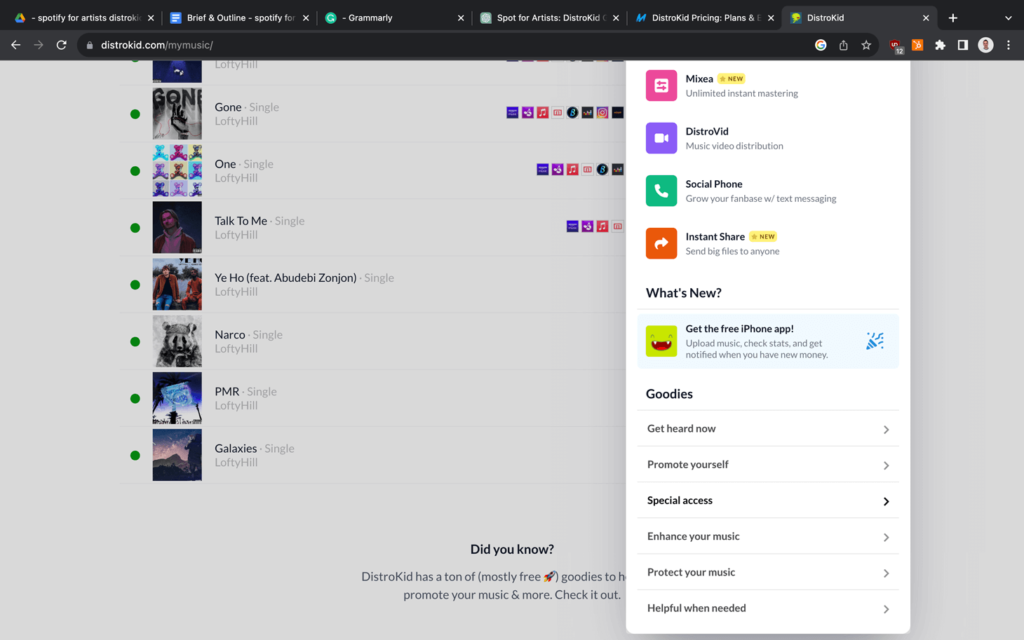
3. Navigate to “Special Access”
Scroll down for the “Special Access” option in the feature menu.
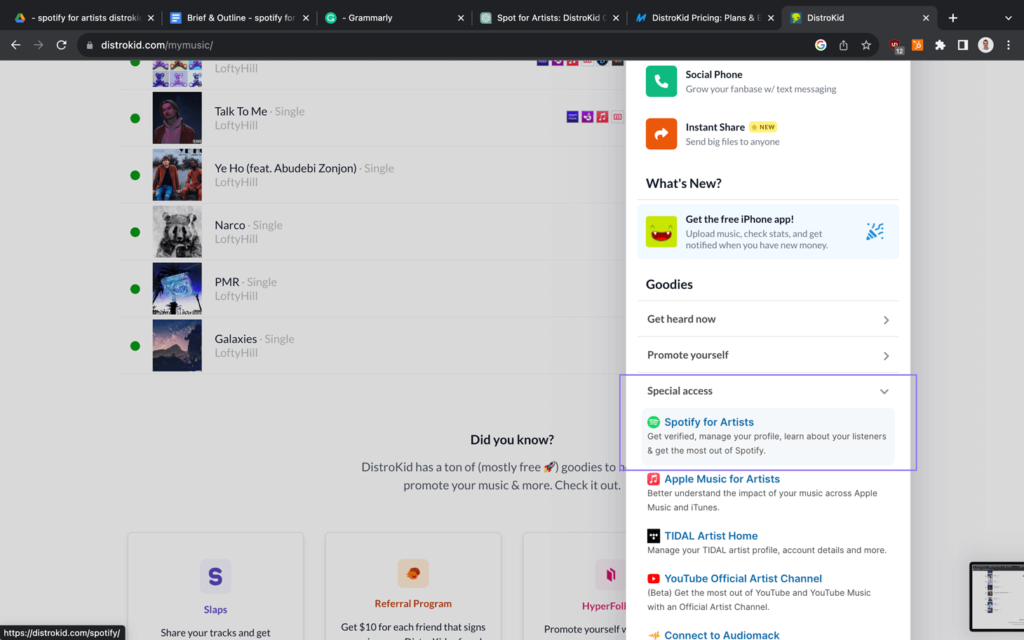
4. Access “Spotify For Artists”
Click on “Special Access,” and you will have various options. Look for “Spotify For Artists” and click on it.
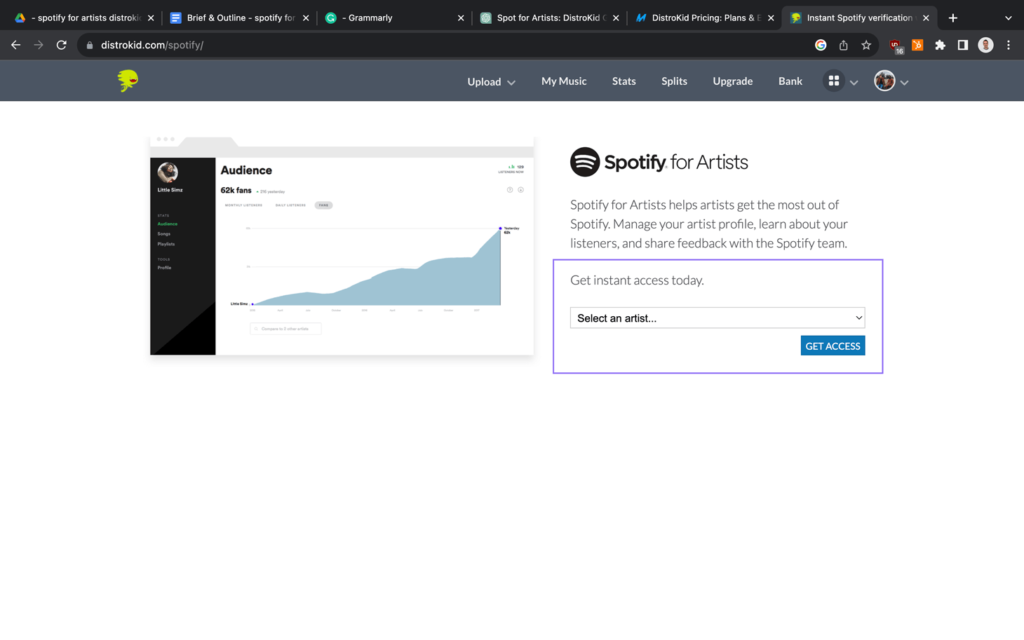
5. Select the Artist Profile
You’ll now see a list of artist profiles you want to access through DistroKid.
Choose the specific artist profile you’re interested in, and click “Get access.”
6. Grant Access
After selecting the artist profile, you’ll be prompted to agree to give DistroKid access to your “Spotify For Artists” profile.
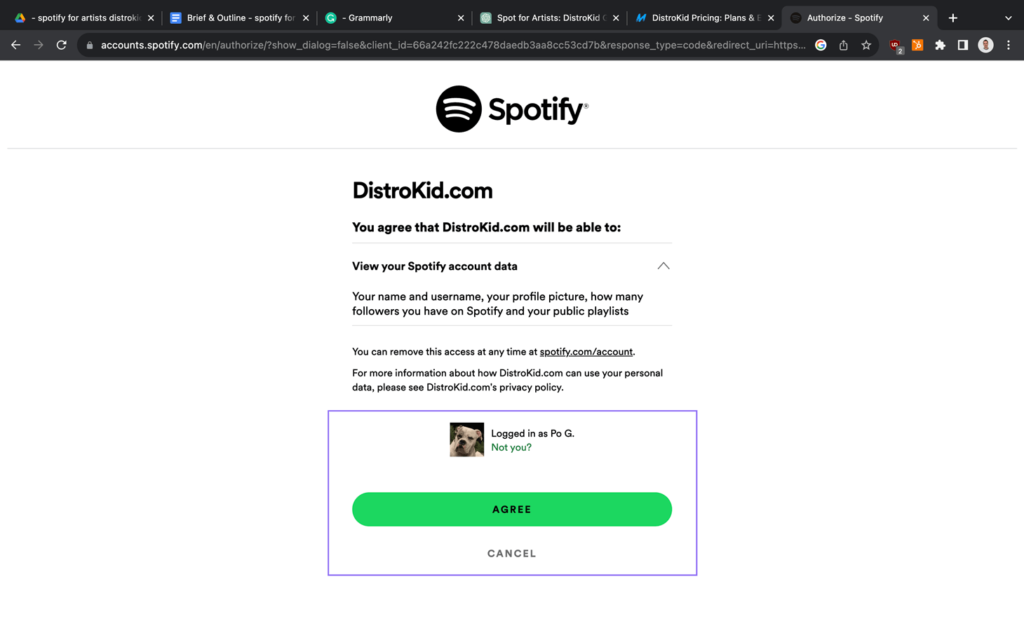
Click “Agree” to authorize DistroKid’s access.
That’s it! You’ve successfully navigated the steps to grant DistroKid access to your “Spotify For Artists” profile for the selected artist. This access allows you to manage and monitor your artist’s presence on Spotify more effectively.
What Are the Advantages and Disadvantages of Using DistroKid?
Here are some advantages and disadvantages to help you decide whether to use DistroKid.
Advantages of Using DistroKid
Below are the main advantages of using DistroKid.
- Simplified Music Distribution: DistroKid offers an easy and efficient way to distribute music to streaming platforms like Spotify, Apple Music, and more. Artists can upload their tracks, albums, and singles, and DistroKid takes care of the technical aspects of distribution.
- Fast Distribution Times: DistroKid is known for its quick distribution times, with music typically appearing on streaming services within a day or two after submission. It lets artists release their music promptly and stay on top of their promotional efforts.
- Affordable Pricing Plans: DistroKid offers competitive and budget-friendly pricing plans, making them accessible to independent artists with various budgets. The subscription options cater to different needs, allowing artists to choose the plan that best suits their requirements.
- Artist Keeps 100% of Earnings: One of DistroKid’s standout features is that artists retain 100% of their earnings from music sales and streams. DistroKid does not take any percentage of the royalties, ensuring artists maintain complete control over their revenue.
- Transparent Analytics and Insights: DistroKid provides comprehensive analytics and insights into music performance. Artists can access real-time data on streams, listener demographics, and playlist placements, helping them make informed decisions about their music career and promotional strategies.
Disadvantages of Using DistroKid
The main disadvantages of using DistroKid are listed below.
- Lack of Personalized Support: DistroKid’s emphasis on automation and efficiency means that personalized customer support may be limited. Artists encountering specific issues might have to rely on knowledge bases or community forums for assistance.
- No Physical Distribution: DistroKid focuses solely on digital music distribution, so artists looking to distribute physical copies of their music (e.g., CDs or vinyl) must explore alternative distribution channels.
- No Manual Store Selection: DistroKid automatically distributes music to various popular platforms, but artists cannot manually select specific stores or streaming services. This lack of control may be a drawback for those seeking more targeted distribution.
- Lack of Label Services: DistroKid primarily focuses on individual musicians and independent artists. As a result, it may offer different label-oriented services than more prominent distributors may provide to artists with extensive catalog sizes or complex release strategies.
- Dependence on DistroKid’s Platform: By using DistroKid, artists become reliant on the platform for managing their music distribution. Should an artist wish to switch to another distributor, they may need to control the transition carefully to avoid disruptions to their music catalog.
Overall, DistroKid offers a convenient and accessible platform for independent artists to distribute their music digitally, strongly emphasizing empowering artists to retain control over their earnings. However, before committing to its services, you should know the platform’s limitations and your specific needs and consider alternative solutions.
What Are Other Digital Music Distributors and Aggregators?
Distrokid is just one of the many distributors you can use. Below is a list of alternative service providers.
- TuneCore: TuneCore is a popular digital music distributor that allows artists to upload and distribute their music to various online platforms. Artists retain 100% of their royalties, and TuneCore offers additional services like music publishing and sync licensing.
- CD Baby: CD Baby is an established digital distributor that provides independent musicians with the tools to sell and distribute their music worldwide. Artists can access various promotional features and keep 91% of their royalties.
- Reverbnation: Reverbnation offers music distribution services alongside artist promotion and networking tools. Artists can reach a global audience and access detailed analytics about their music’s performance.
- AWAL (Artists Without a Label): AWAL is a distribution service catering to independent artists and provides in-depth analytics, playlist pitching, and access to various platforms. Artists retain ownership of their music and receive 85% of royalties.
- Symphonic Distribution: Symphonic Distribution offers music distribution services, YouTube monetization, and sync licensing opportunities. Artists can customize their release strategies and retain 100% of their royalties.
- Amuse: Amuse is a free music distribution service that enables artists to release their music on major streaming platforms. They offer additional features like royalty advances and keep 100% of royalties.
- ONErpm: ONErpm is a global music distribution service that offers artists access to various platforms and a YouTube network. Artists can retain 85% of their royalties and access audience insights.
- Ditto Music: Ditto Music provides distribution and promotional services to independent artists. They offer customizable release campaigns, and artists retain 100% of their royalties.
- RouteNote: RouteNote offers both free and paid distribution plans for artists. They distribute music to significant platforms and offer additional promotional services.
- Landr: Landr is primarily known as an AI-powered mastering service, but they also offer music distribution to significant platforms, allowing artists to release their music globally.
Final Thoughts
So, we’ve explored the ups and downs of using DistroKid as our go-to music distribution platform. I highlighted how DistroKid simplifies music distribution to major streaming platforms, offers fast distribution times, and allows artists to retain 100% of their earnings. However, I also discussed potential limitations, such as limited personalized support and no physical distribution options.
Despite these drawbacks, DistroKid remains an attractive option for independent musicians. Its straightforward interface and affordable pricing plans make it a convenient and effective way to access Spotify for Artists and other primary streaming services. By using DistroKid, artists can gain valuable insights into their music’s performance and audience engagement, helping them make informed decisions to enhance their music careers.
Aspiring musicians and established artists should consider the benefits of DistroKid’s streamlined distribution process. Embracing digital music distributors like DistroKid empowers artists to reach a global audience, connect with fans, and take charge of their musical journey.
In today’s ever-evolving music landscape, leveraging tools like DistroKid and Spotify for Artists is vital for staying ahead in the competitive industry. Aspiring musicians are encouraged to embrace these platforms to unlock their full potential, expand their reach, and make a lasting impact in the music world. With DistroKid by their side, artists can focus on their passion for creating music while confidently navigating the path to success.